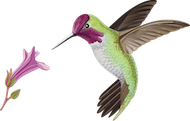Whether you have an acre of land or a balcony, whether you live in the country, the suburbs or a bustling urban area, gardening with native plants is practical, easy and affordable. It’s also a rewarding way to feel more connected to the place you call home, and to attract and enjoy native wildlife of all kinds—especially birds and other beneficial pollinators that have seen their habitats greatly diminished, or even destroyed, by human encroachment.
All it takes to get started is some space, some plants and a little gardening know-how. The Theodore Payne Foundation and the California Native Plant Society are both great resources.
Why Grow Native?
- Wildlife habitat. Native plants attract and feed native birds, butterflies, bees and other pollinators.
- Drought tolerant. Many native plants save water and are naturally adapted to thrive in our ecosystem, climate and soil.
- Native plants are beautiful! They’re rich in color, form, texture and aroma and create a striking look in any style of garden. Strategic planting can yield year-round blooms.
- Your ecological cultural history. Native plants connect you to the ecology and rich cultural traditions of your region.
- No fertilizer. Native plants require little to no fertilizers and are generally low maintenance when thoughtfully chosen for the site.
California is a recognized biodiversity hotspot, with more than 6,500 native plant species, 40 percent of which are endemic to the state—meaning they occur naturally nowhere else on Earth. In fact, California has more native and endemic species than any other state in the U.S.
Hundreds of varieties of native plants are available to home gardeners through nonprofit and commercial nurseries throughout the state.




